How To Transform Your Magento SEO Strategy With AI-Driven Content (Download Our Free Prompt Collection Now)
by
Jeremy Tang - Updated
23-Dec-2024

AI can revolutionize your Magento SEO strategy by addressing unique challenges like duplicate content, tangled URLs and performance bottlenecks. Using AI tools, you can optimize content and meta elements for better visibility, automate repetitive tasks such as internal linking and schema markup and refine keyword strategies with a focus on high-conversion long tail phrases. Advanced AI-powered programmatic SEO solutions like CMAX simplify scaling content, improve cross-linking and tackle Magento-specific hurdles, enabling efficient workflows and enhanced performance.
Magento, now called Adobe Commerce, is a powerhouse e-commerce platform built for flexibility and scalability. If your business has complex needs, it’s the kind of CMS that can grow with you.
When people think of e-commerce platforms, Shopify tends to steal the spotlight, thanks to its massive 26% market share (Source: MobiLoud). Naturally, Shopify SEO services are also in much higher demand. But Magento, with its smaller share of under 5%, punches well above its weight. It’s trusted by giants like Coca-Cola and T-Mobile for a reason.
Magento’s real strength lies in its ability to be customized and scaled to fit the unique demands of your business. But there’s a trade-off: this level of flexibility brings SEO challenges that can feel overwhelming to tackle manually.
The solution? AI.
Magento’s flexibility is a powerhouse for growth, but it comes with its share of hurdles. Managing a Magento site often means dealing with headaches like tangled URLs, duplicate content, or site performance hiccups. As your operations scale, these challenges can grow right along with you, making it essential to zero in on the specific pain points holding your business back.
The key is understanding which of these SEO hurdles are the biggest roadblocks in your unique setup. Once you’ve mapped them out, you can tackle them head-on with AI-driven solutions that align with your broader SEO strategy.
Plus, figuring out which tasks AI can handle best – like automating fixes for duplicate content or streamlining performance improvements – can save you time and effort while driving better results.
Even the most robust e-commerce platforms like Magento face hurdles that can stymie growth. But if you hire an SEO agency with e-commerce expertise and AI-powered solutions tailored to specific needs, these problems can transform into opportunities for growth.
Here’s how to tackle four key challenges effectively:
Challenge: Repetitive product descriptions and unoriginal category pages hurt search rankings.
AI tools like Writesonic’s Free AI Sentence Rewriter can breathe new life into stale content. Instead of duplicating product descriptions, these tools can be used to rewrite them and make each one unique and engaging.
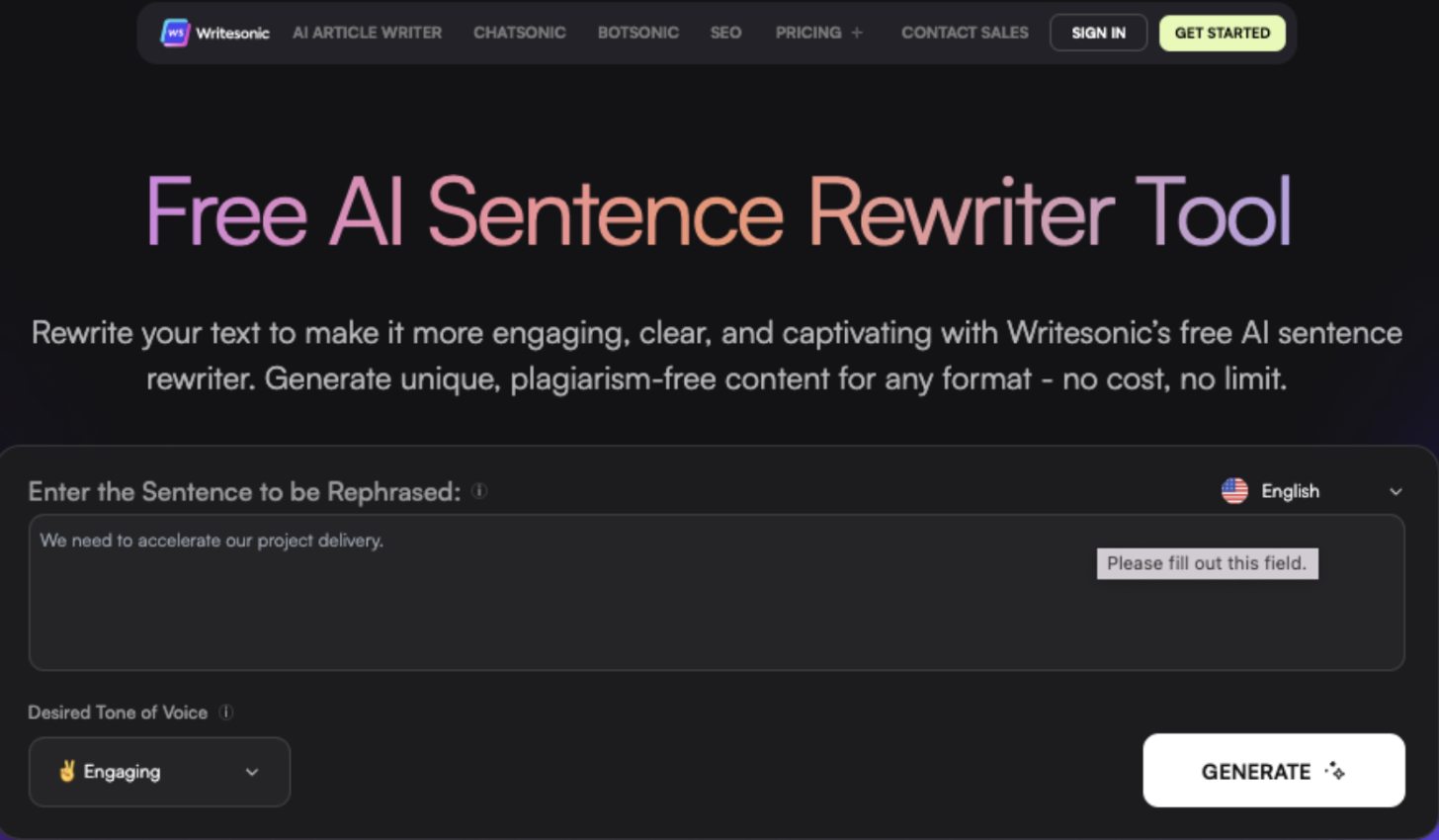
Challenge: Magento’s complex URL structures often lead to poorly optimized links.
Enter Quattr’s SEO-Friendly URL Generator, a smart tool that creates clean, structured URLs aligned with SEO best practices. This tool creates clean, readable URLs that match your H1 headings and align with SEO best practices. Better yet, this makes it simple to navigate your site, keeping both users and search engines happy.
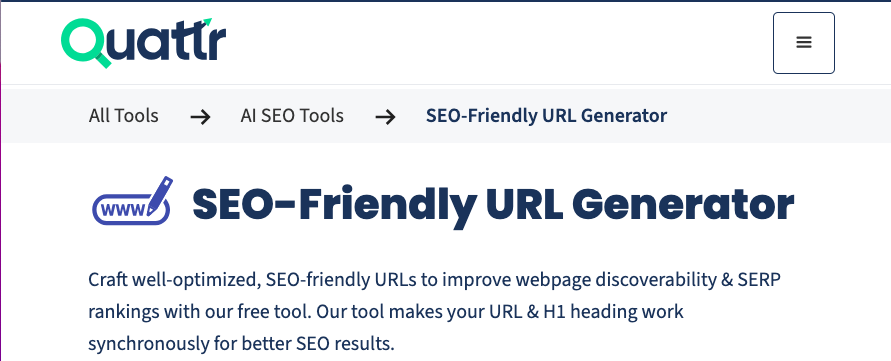
Challenge: Slow-loading pages drive customers away and hurt your SEO.
New Relic offers a two-fold solution: real-time monitoring and actionable insights via its AI-powered chat assistant. Apart from pinpointing performance bottlenecks in real time, it actually offers tailored fixes. Apply its insights, and you can craft a faster, smoother shopping experience that keeps customers engaged and coming back for more.

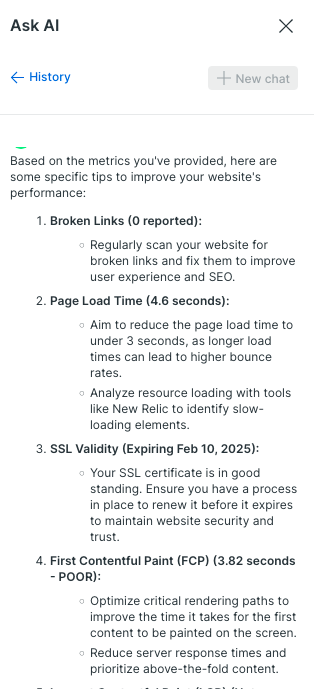
Challenge: Magento’s flexibility can overwhelm developers with intricate coding requirements.
For sites with heavy custom coding needs, GitHub Copilot is a lifesaver. It provides automated code suggestions and checks for errors, so developers can roll out unique, SEO-friendly features faster and without unnecessary delays.
Targeting the right audience means focusing on keywords that attract buyers ready to act. Long tail keywords are the secret weapon here – they’re specific terms your customers search for when they’re close to making a purchase. Unlike high-competition head terms, long tail phrases deliver qualified traffic with stronger conversion potential.
To get started, map out your main, broad keywords – the foundation of your business. Then use AI-powered tools to refine these into long tail variations.
Finding the right seed keywords is the first step to boosting your Magento store’s visibility.
Seed keywords are the foundational terms tied directly to your products or services – think phrases like “handmade jewelry” or “eco-friendly baby products.” These keywords help potential customers find you.
If you want to streamline the process of finding them, tools like SEO.AI’s Keyword Finder are your best friend. Just provide a quick description of your business, and the tool generates relevant search terms tailored to your store. This saves time while ensuring your content aligns with what users are searching for.

Once you have your seed keywords, you can refine your strategy to target high-value, long tail variations.
Focusing on long tail keywords is one of the smartest ways to drive traffic that converts. These keywords capture niche interests and ultra-specific search intents, giving you a better chance of landing right in front of the people who need what you’re offering.
With ChatGPT, you can zero in on the exact phrases shoppers type into search bars, boosting your visibility and connecting with users who are already primed to engage.
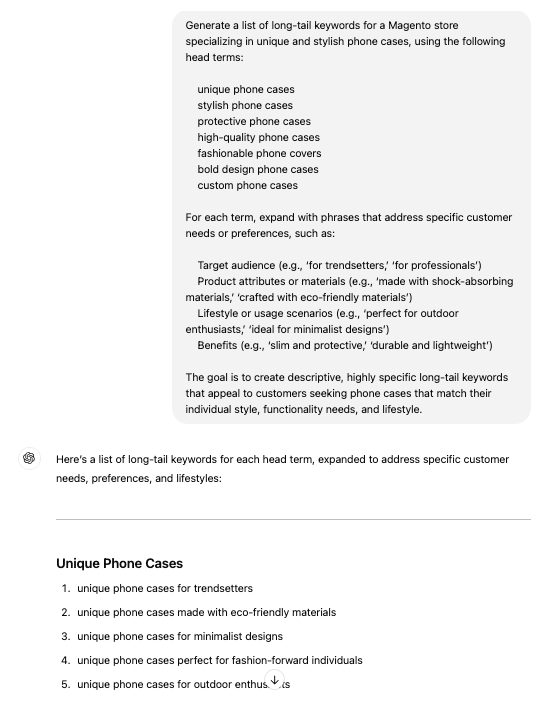
To keep your Magento store relevant and engaging, build a content schedule that directly aligns with your keyword insights. Focus on search trends and analyze the relevance and search volume of each keyword. That way, you can organize your topics in a way that ensures consistent value for your audience.
Pro tip: Plan your posts to align with seasonal spikes and trending topics in your industry.
For example, if certain products peak during the holidays, schedule content around those keywords well in advance to capture search interest when it matters most. This ensures your store stays visible and competitive during key moments.
Enhancing what you already have is one of the smartest ways to boost your Magento store’s SEO. AI tools can take the heavy lifting out of the process, helping you fine-tune on-page SEO elements, make high-impact tweaks and make your pages more relevant to your audience.
When it comes to on-page SEO, getting the fundamentals right is half the battle. Meta descriptions, headers and product descriptions are like your storefront’s welcome sign – they either draw customers in or fail to capture anyone’s attention.
Here’s an example of what you could do:
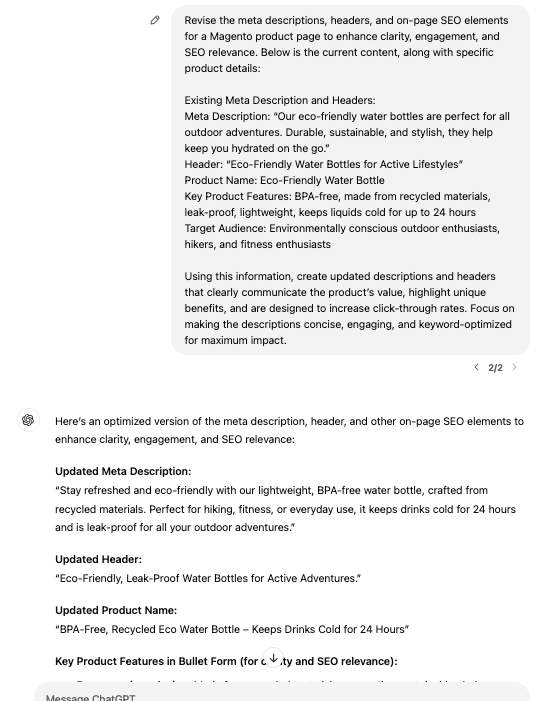
Your website’s content is the foundation of how your audience interacts with your brand. But take note: not all content is created equal.
Some pages are pulling their weight, driving traffic, converting leads and boosting your bottom line. Others? They’re just taking up space. And if you want to distinguish the high-performers from the underachievers, you need to dig into the data.
AI insights, combined with tools like Google Analytics, are perfect for this.
AI can look at the performance data and quickly tell you what’s working and what’s falling flat. It can even go a step further, identifying content gaps that might be costing you.
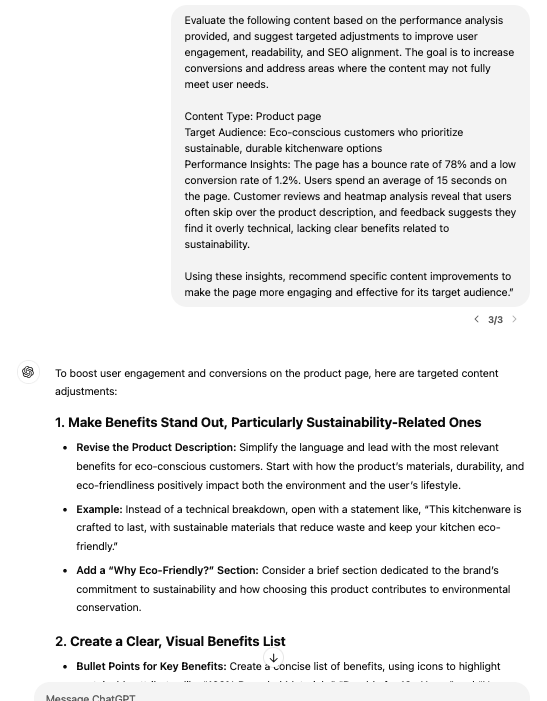
AI tools can guide you in fine-tuning your content by highlighting areas ripe for improvement. They could suggest that you:
If you notice that you’re spending too much time on repetitive SEO work like optimizing dynamic pages, tweaking schema markup and managing internal links, you’ll be happy to know that you can offload all of these to AI. Doing so frees up your time to focus on the bigger picture, like crafting strategies that actually move the needle.
Dynamic pages like product listings and business details are the lifeblood of a modern website, and keeping them relevant is non-negotiable. But with ChatGPT, you can ensure these pages are always up-to-date without investing too much time or effort. Here’s how:
With ChatGPT maintaining a repository of your business’ FAQs and most common inquiries, you can effortlessly craft consistent and well-structured answers. This tool allows you to seamlessly incorporate new questions as they arise, ensuring your FAQ section remains a go-to resource for your audience.
Pro tip: Focus on the consistency of your phrasing and formatting. Doing so ensures that your answers are presented in a way that reflects your brand’s tone and professionalism.
Keep your business information current.
It goes without saying that you should prioritize updating your high-traffic pages – pages that include your store hours, product availability or contact details. With ChatGPT, you can quickly generate and update snippets of content to reflect real-time changes, whether it’s seasonal adjustments or new store openings.
Promotional pages and banners often need frequent tweaks, and this is where ChatGPT shines. By setting specific prompts, you can generate polished and impactful copy that aligns with your current campaigns. Although this process won’t be 100% automated, it allows your team to stay nimble, adapting content to market shifts without wasting extensive time on drafts and rewrites.
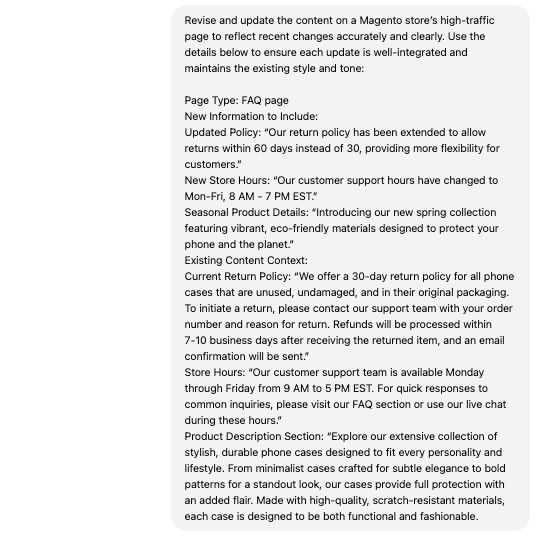
Think of schema as the translator between your website and search engines, enabling them to understand your content better and display it effectively in search results. It directly impacts your site’s click-through rate (CTR) as well. After all, when your website’s information is displayed in rich snippets, such as star ratings or product availability, it becomes a lot more enticing to your audience.
Setting up schema markup may sound technical, but with AI, it’s easier than ever.
Using tools like ChatGPT, you can automate the creation of structured data tags and ensure that every detail is tagged correctly. All you need to do is provide specific details about your business – like product descriptions, star ratings or current promotions – and let ChatGPT generate schema types tailored to your content. For instance:
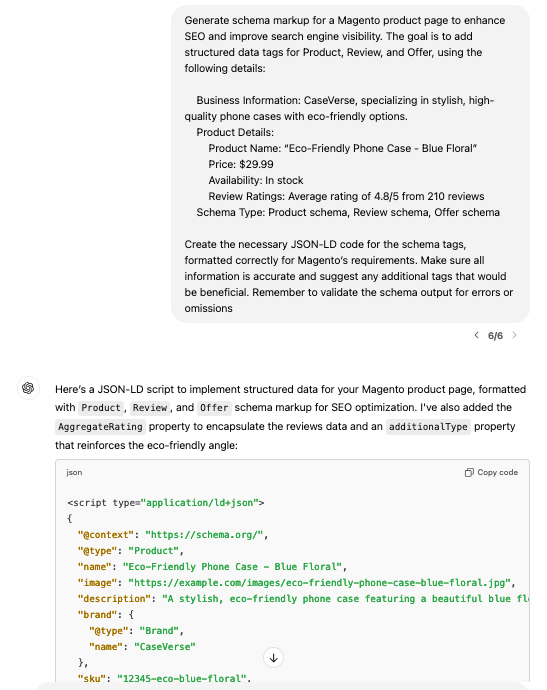
Once your schema is ready, run it through tools like Google’s Structured Data Testing Tool to make sure everything’s accurate and plays nicely with Magento. Even though ChatGPT speeds up the process, it pays to have an extra layer of security in place.
If you want more ideas, feel free to check out our ChatGPT-generated schema markups.
Managing internal links on a sprawling Magento store can quickly turn into a logistical headache. With so many categories and products, keeping everything aligned is no small task.
Alt text might seem like a small detail, but it’s a powerhouse for boosting both accessibility and SEO. Essentially, it helps search engines understand your images and ensures that people with visual impairments get the full context of your content.
Keeping your Magento store visible and thriving means staying on top of performance metrics that matter for e-commerce – traffic, conversions, rankings – and tweaking your approach based on what the data is telling you.
Monitoring the performance of your content is key to maintaining SEO effectiveness.
For an ecommerce site, metrics like time on page, bounce rates, and conversion rates are invaluable.
Refining your ChatGPT prompts based on performance is a smart way to ensure your AI-generated content connects with your audience and drives better SEO outcomes.
If your analytics flag high bounce rates or low engagement on specific pages, that’s a cue to revisit your approach. Adjusting prompts can lead to sharper headlines, more engaging meta descriptions and, ultimately, a user experience that keeps readers coming back.
The competition is never going to slow down, and Magento store owners know this better than most.
Staying relevant means you can’t just react to change; you have to anticipate it. AI-driven insights can be highly impactful for this, shifting your approach from reactive adjustments to a forward-thinking strategy designed for impact.
This all comes down to understanding patterns. Whether it’s seasonal shopping spikes or the subtle shifts in user behavior, AI tools can reveal what your customers are doing, what they’re searching for and, most importantly, what they’ll need next.
Savvy business owners can leverage AI to pinpoint which product categories surge during specific times of the year. For example, if your Magento store specializes in outdoor gear, AI can highlight how searches for camping equipment spike well before the summer season starts.
If you’re ready to enhance your Magento SEO with AI-driven content, we’ve got just the thing to kickstart your journey: a complete collection of ChatGPT prompts designed to simplify every step of the process.

With these prompts, you’ll be equipped to handle everything from keyword-rich product descriptions to localized landing pages, all while ensuring your content stays fresh and adaptable to algorithm changes.
So, if you’re ready to take the guesswork out of your SEO, download the collection here: Area Ten ChatGPT Prompt Collection
From building smart cross-linking strategies to keeping out-of-stock product pages relevant, we tailor every move to fit Magento’s structure. Our SEO agency in Australia delivers 100% solutions – no excuses, no fluff. We strip away inefficiencies and leverage smarter tools to put your brand front and center.
If you’re ready to trade outdated norms for precision and power, Area Ten is your ticket to SEO freedom. Call us now and book your FREE SEO Fast Track.
Book a free video consultation below to see how your SEO & Paid Media campaigns are performing against global benchmarks in your industry.
We’ll uncover tangible opportunities to grow your business in just 6 weeks, including: